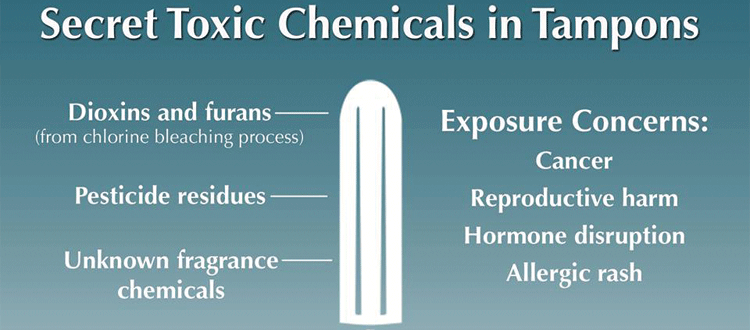New York Introduces Compulsory Declaration Of Ingredients In Female Tampons and Sanitary Items Amidst Growing Health Implications Globally
Source: Thailand Medical News Nov 20, 2019 6 years, 3 months, 1 week, 5 days, 7 hours, 30 minutes ago
Another progressive politician, New York Democratic Governor, Andrew Cuomo, has signed a new law that requires manufacturers of
menstrual products to disclose the ingredients on their products. The law will be put into effect starting 2020 gives manufacturers 18 months to develop new packaging and labels. As stated by Gov. Cuomo, many consumers aren’t aware of the toxic and/or allergy-causing ingredients in their
menstrual products, and the US FDA has avoided requiring manufacturers to disclose ingredients for several decades.
 Tampons
Tampons and other
female sanitary ware are widely reported as containing toxins, allergens, carcinogens, and endocrine disruptors that impact the hormonal system, including but not limited to dioxin, chlorine, rayon, GMO cotton, and fragrances. dioxin and chlorine are both used in the bleaching process and are widely known to cause hormonal issues as well as immunity problems. Rayon is a high absorbency compound linked to toxic shock syndrome, while GMO cotton contains traces of pesticides.
Tampons containing fragrance can cause allergies and PH imbalance. Consumers can avoid these ingredients by choosing
menstrual products that disclose their ingredients and by sticking to products that are 100% organic.
Cuomo tweeted the news on Friday after signing the law, writing, "I am proud to sign legislation making New York the first state to require ingredient disclosure, ending an injustice and empowering women to make their own decisions about what goes into their bodies.”
Assembly member Linda B. Rosenthal’s
bill to require labeling on menstrual products first passed in June 2018 by the Assembly Committee on Consumer Affairs and Protection. The original bill required disclosure of the percentages of ingredients, including any chemicals or byproducts of chemicals, in
feminine hygiene products such as tampons, pads, menstrual cups and period underwear.
Tampons are typically made of cotton, rayon or a blend of materials. The Food and Drug Administration considers them medical devices so ingredients do not have to be listed on the packaging.
A study commissioned by the US FDA Office of Women’s Health to address claims that dioxin, an organic pollutant, could be found in
tampons, revealed that one regular tampon would provide less than 0.2% of a woman’s recommended maximum intake of the pollutant for a month and would pose no health risk.
Dr Philip Tierno Jr, clinical professor of microbiology and pathology at NYU School of Medicine told
Thailand Medical News in a phone interview, “Sure, dioxins are in the environment, but when a woman uses several
tampons throughout the day and somewhere in the neighborhood of 11,000 during her reproductive life, that’s a lot of dioxin expo
Another previous study examined 11 different types of
tampons as well as four types of menstrual c
ups and linked growth rate of bacteria that causes
Toxic Shock Syndrome.
Increasing health problems like reproductive issues and urinary tract infections are caused by poor
menstrual hygiene. Doctors recommend changing
tampons every four to eight hours, washing your hands before using, and choosing the lowest absorbency based on your personal needs.
An environmental advocacy group, Women's Voices for the Earth tested pads from the brand Always in 2014, and found the products released chemicals like styrene, chloroethane and chloroform.
The WHO (World Health Organization) classifies styrene as a carcinogen. The EPA says short-term exposure to high concentrations of chloromethane can have neurological effects. And the Centers for Disease Control and Prevention says high levels of exposure to chloroethane can result in lack of muscle coordination and unconsciousness.
Although the levels found in the pads were relatively low, advocacy groups still say people who menstruate should be able to decide what they want to allow into their bodies.
It's not just pads many
tampons contain rayon, a synthetic made from sawdust and a byproduct of it is dioxin, which the EPA says is likely carcinogenic. The FDA says trace amounts of dioxin aren't a concern for human health, but Philip Tierno of the New York University School of Medicine told media that it can build up over a lifetime of use.
"Yes, one
tampon is trace," he said. "But when females use approximately 12,000
tampons in a lifetime. That means 12,000 exposures of dioxin, sometimes five, six, seven times a day. That's a lot of dioxin absorbed directly through the vagina. It goes directly into the blood."
Although some companies are moving to publish information on what goes into menstrual products on their websites, Dr Tierno said it's not enough. "Even if they list some ingredients, they may not be listing all of them," he said.
The FDA already requires manufacturers to provide labeling on packaging about the signs of
Toxic Shock Syndrome, and how to minimize risk.
There has been a growing increase in various cancers in females and also fertility issues along with immunity and hormonal related health issues, many which can be indirectly traced to toxic compounds getting into the bloodstream of females. It also a growing concern as more younger females are contracting these diseases.
In Asia, many manufacturers of female sanitary items do not even care about their customer’s health and in order to remain profitable, often use components that are laden with toxic chemicals but are cheaper. They get away with it because of lax regulatory controls.
